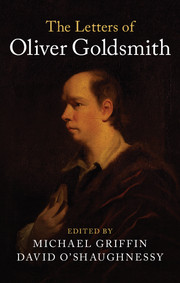49 - To Joseph Cradock, [London, c. 17‒18 March 1773]
Summary
The opening night of She Stoops to Conquer saw Goldsmith, sick with nerves, go for a walk in St James's Park rather than attend Covent Garden Theatre. His apprehension – and indeed that of George Colman – proved unfounded as both audiences and critics expressed their approbation on the first few performances of the play. Reviews in the London newspapers were generally very positive and some noted that, unlike many contemporary authors, Goldsmith had not relied on the biased support of his friends who attended the opening night (Johnson, Reynolds, Burke and Richard Cumberland) to carry the play. In this letter, Goldsmith is anxious to assuage any imagined offence he had given Cradock by not using his epilogue but, typically, he also slides into melancholy even at this moment of great success. The letter must have been written after the first performance on 15 March but before the first benefit night of 18 March.
The copy-text is the manuscript in the Bibliotheca Bodmeriana, Switzerland. It was first published in Cradock's Literary and Miscellaneous Memoirs (1826). It is addressed ‘To | J. Cradock Esqr. at Gumbley | near Harbro’ | Leicester-Shire’. It is postmarked 20 March. Balderston dated the letter 16 March. We suggest a slightly later date because of the postmark and also because the newspapers’ attacks on Colman appear first in an evening paper of 16 March.
Balderston relied on the version published in Cradock's Memoirs. There are many minor differences in our transcription, related to capitalized letters and punctuation in the main. There are also three significant omissions in Cradock which are restored here. Firstly, the post scriptum text ‘I beg you’d send me an answer’ indicates an unusual level of concern for Goldsmith about the reply. Secondly, we have reversed Cradock's judicious deletion of Goldsmith's second sentence: ‘The news papers are now abusing Colman to some purpose.’ It is possible that Cradock, impecunious when publishing his Memoirs and who had dramatic ambitions himself, was hesitant about irritating George Colman the Younger, then Examiner of Plays, but it may simply have been common courtesy. Goldsmith's dismissive reference to the then retired actor John Quick (‘for nobody would think of letting Quick speak the Epilogue’) is also restored here for the first time.
- Type
- Chapter
- Information
- The Letters of Oliver Goldsmith , pp. 113 - 115Publisher: Cambridge University PressPrint publication year: 2018



